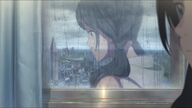Those who are accidentally spoiled are not lucky enough to have their memories erased like the protagonist of the director's previous work.
"your name. "shows Makoto Shinkai's strong box office appeal. If creators don’t make commercial success or failure a top priority, at least they won’t exclude high box office returns. Now that the last time was a great success, let's try it again with the same recipe. "your name. " is a perfect combination of the director's personal aesthetic style and the script creation formula of genre films. "Weathering With You" also makes people feel that Director Shinkai's humble attitude of restraining his desire for self-expression and respecting the narrative laws of genre films - at least the first half of the film Is such that.
The opening scene is the image of the heroine Hina praying, and the audience realizes that this is a story with supernatural powers just like the director's previous work.
The hero Hodaka appeared on a passenger ship. He was going to Tokyo, where he wanted to show off his skills and become a man. In the rainstorm, his excited expression seemed to shout "I'm the King of the World!" Then he was in danger the next second. Fortunately, an uncle named Suga who passed by came to the rescue. The uncle told the boy that instead of You Jump I Jump, it's better to sit down quietly and drink beer while watching "Junior Jump". In the director's previous work, the protagonist Taki's crush was dubbed by Nagasawa Masami. This time, there are also familiar actors in the seiyuu lineup, such as Oguri Shun, who is more and more familiar with interpreting the roles of various uncles.
After Hodaka arrived in Tokyo, due to financial constraints, he could only sleep in an Internet cafe. Here's a quick cut to the bathing scene several times in a row, with "Your Name." "In the first half of the episode, there were many scenes of opening the door to go to school in the morning. The same expression technique was used to create laughter in the repetition, but at the same time, the protagonist accumulated a sense of anxiety.
Hodaka, who is out of touch with life in Tokyo, meets Nagi, an elementary school boy who enjoys the same blessings on the bus. The funny episodes that seem to have nothing to do with the main story are actually paving the way for the following plots, and by the way, it also reflects the embarrassment of the hero Fan Gao - even elementary school students can have two girlfriends, but he is alone.
There is always a "saving the cat" moment in genre films to establish the audience's sense of identity with the protagonist. In this film, this "saving the cat" moment really manifests itself as saving the cat in the literal sense. Fan Gao, who was living on the street, met Xiao Yu, a scrawny stray cat, and gave him what little food he had left. The setting of this episode is similar to that of "Aladdin" in the first half of the year. In that movie, the protagonist Aladdin is not rich, but he is willing to give food to children who are more difficult. However, the moment of saving the cat in that play was followed by a gorgeous and ingenious chase scene. Since the audience knew that Aladdin's food was hard-won, they would have a stronger sense of identification with the protagonist. In contrast, the film does not explain the source of the food directly from the body appears to be relatively common.
Fortunately, director Makoto Shinkai arranged for the protagonist's second wave of "Save the Cat". Hodaka was bullied by the nightclub's bodyguards and knocked over a trash can when he fell to the ground. In this case, his first reaction was not to reason with others, but to pick up the scattered garbage first. This upbringing allowed him to further win the favor of the audience. We will feel that such a protagonist, no matter what good things happen to him, he deserves it.
"Good luck" comes right away. Hodaka found a pistol in the trash. With a weapon in hand, a person will feel more secure. But the pistol won't solve Hodaka's financial crisis. He fell asleep in Mc[Beep] Laurie, looking very depressed. He doubted himself: should he continue to struggle in Tokyo?
The events that prompted him to make a crucial decision happened. The heroine Yang Cai, who worked in Mai [beep] labor, entertained Hodaka and ate a giant [beep] tyrant. The stranger's kindness reassures Hodaka. He decided to keep fighting in Tokyo, so he found Uncle Suga, who had rescued him once on the boat, and got a job offer from him.
Uncle Suga is engaged in the new media industry, and his goal is to produce popular articles. The recent continuous rain in Tokyo made them decide to do a feature on "Sunny Girl". Speaking of Sunny Girl, the dance of the 3unshine group immediately popped into my mind.
Looking for 3unshine... No, it should be an errand to find a sunny girl. Of course, I can't leave it to a rookie like Hodaka to do it myself. His partner Xia Mei is a good-looking young lady, whose voice is provided by Honda Tsubasa. Xia Mei's related scenes mainly show the director's obsession with breasts, like "Your Name." "In Taki every time he wakes up as Mitsuha, he has to rub his chest. As a straight male audience, this is very useful.
The active search was fruitless, but Hodaka's heroic rescue of beauty led him to find the real sunny girl - it was Hina who had a meal for him. After seeing Yang Cai's miracle of manipulating the weather, Fan Gao, a business-minded man, immediately thought of an O2O Internet + entrepreneurial project. He made a special visit and persuaded Hina to partner with him. At Yangna's house, Hodaka also met Yangna's younger brother, Nagi, the elementary school student he had met on the bus who enjoyed the blessings of everyone.
The "games and entertainment" part of the story is mainly about Harina using her super power to control the weather to help different people, interspersed with some funny or touching small branches. This paragraph has the feeling of a superhero origin story, and the male protagonist also specially designed battle clothes and weapons for the female protagonist. In this film, the characters from the director's previous work are used as easter eggs. In my opinion, the characters should be placed at the end of the film. Mitsuha Miyami suddenly appeared and told Amano Yangna that she was not the only high school girl with superpowers, but Makoto Shinkai was a superhero. The curtain of the cinematic universe was thus opened. The heroine Hina's superpower is basically equivalent to the Storm Girl in "X-Men". When people get married, they are looking for local tyrants like the Black Panther who have mines at home (although it didn't last long), while Amano Yangna can only find Muggles like Hodaka to get in the door.
Haruna saved the fireworks festival and helped Uncle Suga get the chance to get along with his daughter, feeling that his life has reached its peak. This is exactly the "false victory" at the midpoint of the plot. At the same time, the "wicked" should also be approaching. There are two "evil forces" in this film, one is directed against the hero Fan Gao, mainly the police investigating illegal guns; the other is the tragic fate of the sunny girl. The heroine with supernatural power also suffers a cursed fate. This setting of this film is also related to "Your Name." "same.
The whole movie is divided into two parts. The first half is very neat. From the second half of the second act, there are signs of playing off. First of all, the heroine's sister and brother's motives for fleeing with the hero were insufficient. It was just that the heroine asked the heroine to explain verbally that the police would break up their siblings - the police who originally came to track down the hero Hodaka, brought along by the way. With such bad news, this is a bit too much by the way, and it has reached the level of smoothness. The second is the motive of the villain - I thought at first that the police were only investigating guns on the surface, and there must be a deeper conspiracy behind them, but they really came for the guns. It is said that the heroine's superpower is obviously more noticeable than the hero's gun. Those Japanese policemen have no idea how shallow they are, and they actually ignore such an obvious target and wander around a broken gun. At this time, it is really strongly recommended that CIA, the black hand behind the scenes, come on stage and make a sense of presence. With their urination, they will definitely be interested in the heroine's superpowers and want to arrest her for scientific experiments. Just add a little similar vulgar plot, and the second half of the whole story will be much smoother.
For a fantasy story, the gun is not a very necessary prop, and it can even be said that there is a certain conflict with the temperament of the story. The reason why the director wants to emphasize this unnecessary prop, I can only understand that this is a symbol that symbolizes male [beep] tools. When Hodaka met Hina, because he didn't want to be hated by the other party, he lost his gun. It's like many boys have smoothed their edges and corners in order to make girls accept themselves, and learned to treat others with humility, but this kind of self-acclimation is also a kind of Self-castration, giving up the aggressive qualities of males, also gives up aggressiveness, and can only be sheltered by a partner. When he finally found that his partner could no longer be dragged down by him, after some struggles, he finally picked up the gun again and regained his male identity.
In the second half of the second act, although it has been seen that the director wants to let go of himself a little, it is generally stable. The elements of "games and entertainment" are also carried over to this part. During the escape process, Yang Na used her super powers to help Hogan, and her ability to summon Tianlei was no worse than Thor, and she could activate skills with her bare hands, which made people want to ask Ask Sol, do you want a hammer for a hammer?
In the second half of 2016, two Japanese songs were updated in my mobile playlist, one is "Nothing Is Like" by RADWIMPS, and the other is "Love" by Gen Hoshino. The latter song was ordered by Yang Cai when the three of them sang karaoke. This is also a big laugh of the film. As long as they hear a lyric, the audience can't help but make up a whole set of magical dances. Consciously followed with excitement.
But the cheerful atmosphere did not end there. The film soon entered the "dark night of the soul" where the protagonist lost everything. First, Yang Na disappeared because of the curse of the sunny girl, and then Hodaka was also caught by the police. The most desperate time was also the time of bottoming out. Hodaka learned from the police that Hina was actually younger than him, so he began to thoroughly introspect. Before, because he relied too much on Hina and used her super powers too much, she disappeared.
As the story moves into the finale of the third act, Hodaka gets back on his feet and decides to take responsibility like a man. Another article I wrote a few days ago applied the "Five Points Ending" theory of "Save the Cat", also known as "The Storm Hits the Castle", and I will review it here. To overcome the final difficulty, the protagonist first needs an action plan - Hodaka's plan is obviously to rush to the hospital rooftop altar where Yangna prayed so that he can fly into the clouds; secondly, recruiting horses - Hodaka did not deliberately call partners , it was his friends who came by themselves. Xia Mei rode him for a while, and by the way contributed to the car chase scene in the ending part, but the lover, Amano Nagi, who had long been recognized by Hodaka as the eldest brother, came to support him as a women's clothing boss. Uncle Suga, who had watched the whole movie, finally woke up, and everyone worked together to help Hodaka achieve his goal; the third point was the unexpected setback of the tower falling - Hodaka found Yang Cai, but had to face a difficult choice: save Yang The price of Cai is that Tokyo is swallowed by the rainstorm; the fourth point is that the protagonist gathers the last strength in his heart and regains his strength - Hodaka realizes that only Hina is important to him, and persuades her to give up sacrificing herself in exchange for sunny days; the last is action The result - Hodaka and Hina returned to the ground from the cloud, and three years later hugged each other on the street.
At first glance, the whole process seems to be fine, but the details always give me a subtle sense of incongruity. The problem probably lies with the character Suga. He appeared as a life-saving hero in the first act, which felt similar to the setting of the protagonist's mentor; in the second act, with the appearance of various characters, including the Easter egg character with a very obvious tendency to please the audience, the Suga scene was rejected. Diversion and rapid marginalization; from the second half of the second act to the third act, this character has a villain atmosphere, and the most serious physical attack suffered by the protagonist in the whole film was once from the security of the nightclub, and once from the original Uncle Suga, who should be the protagonist's mentor. Then when Hodaka pointed the gun at Suka, I had already started WTF in my heart. At that time, I made up my mind that if there is a god development like "the protagonist shoots the savior for the sake of getting out", then I will definitely give this movie Movie one star. Fortunately, the uncle of the police came in time to draw a wave of hatred, and the protagonist did not make a big mistake. Then Suka heard the protagonist cry twice, but he found out in conscience that he returned to the ranks of teammates, and his combat power exceeded the table, and quickly controlled the police uncle. The character arc in the third act does not belong to the protagonist, but to Suka, a character who was once reduced to soy sauce. I very much doubt that because some of the main creators are fans of Oguri Shun, they forcibly added a sense of presence to his dubbed characters, giving him all the performance opportunities that should be reserved for the protagonist. But he abandoned the light to the dark, and the dark to the light again, and the arc of the characters turned forward and reversed for a while, and the audience was dizzy, who would empathize with him?
In addition, there is the problem of villain settings. The two "evil forces" in this film - the tragic fate of the Japanese police and the sunny girl, the former is too weak and the latter is too abstract to make the audience feel the same enemy. The issue of the police has been mentioned above. At first, I thought there was a more powerful man behind the scenes, but it didn't. If you don't have it, you don't have to. You can fight for yourself. In the end, the police did show a different momentum. At least they knew they had a gun, but it was useless to carry a gun, and they were still smashed to the ground by the elementary school students. So how useless are the Japanese police? Is it because the police in my own family are relatively weak, so I find it unacceptable to see the police in other people's family once in a while, and start to make a fool of myself?
By the way, Nagi's performance in this decisive battle is too ridiculous. The setting of using the identity of the lover to escape the surveillance is more ingenious, and the foreshadowing in front is buckled, and the laughing fruit is excellent. But after escaping, the police officer on the front was a bit incomprehensible. After all, he had never explained what innate power this young man had before. In fact, it can be changed to that he suddenly appeared in the battle suit of the sunny doll, startled the police, and helped the protagonist to clear the siege. This not only makes full use of the previous foreshadowing, but also adds another laugh if it is handled properly.
Compared to the above questions, the hilarious ending in the end is not a big deal - at least it is hilarious enough. The loudest and longest laughter in the room came after the narration about the sinking of Tokyo. One of my favorite movie lines this year is "Crazy Alien" Shen Teng's line "Destroy it, hurry up, I'm tired", which has been repeatedly quoted recently. And the protagonist of this film interprets this line with practical actions. That kind of ideological realm that only cares about what to do with oneself, and who cares about the floods behind him, has the flavor of "Big Fish and Begonia". Xin Haicheng adds "Big Fish and Begonia". If this film is imported into China, the box office will be at least one billion yuan.
Of course the third act also has details that I like. My favorite is watching the main character run. The protagonist running scene that frequently appears in Japanese film and television dramas has gradually become a funny stalk for everyone to joke about, and this film does not shy away from this, and simply sets the Japanese drama running on the worst street as the "superpower" of the protagonist. Since he arrived in Tokyo, he has been running non-stop, and has been chased by others. Finally, he finally realized what he was chasing, and ran towards the goal with all his strength. On the occasion of parting, Xia Mei shouted "Fan Gao, run!" I don't know if it is a kind of tribute, but I will wishful thinking that the object of the tribute is the movie "Forrest Gump" that I watched when I was young.
At the end of the film, the protagonist Hodaka returns to Tokyo and sees the long-lost cat. The cat in three years is like Thor in five years, and his body has changed greatly. After seeing this, I finally understand that the whole movie is a conspiracy of cats. The cat deliberately induced the protagonist to choose love and give up saving the world. Affected by extreme weather, human society suffers heavy losses, while cats live better. Now that I think about it, it is meaningful to name the cat "Rain", because the rain in the film represents the cat's interests, and it will also become the shape of the cat's favorite fish. So the alias of this movie should be "Meow's Name." ".
View more about Weathering with You reviews











